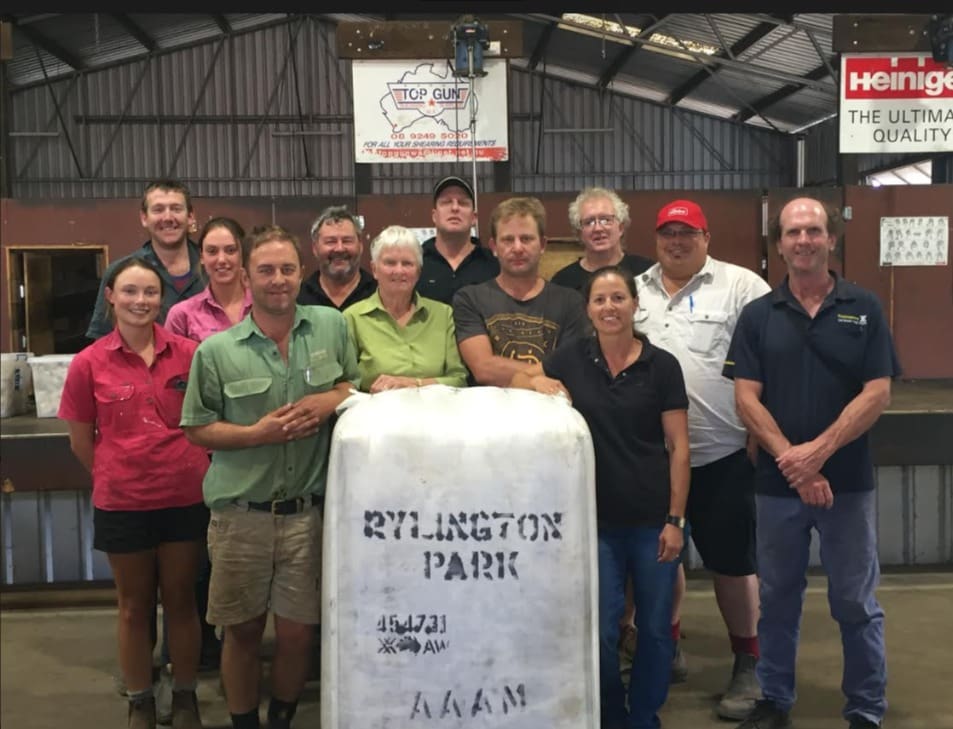
Landmark WA wool broker Matt Chambers, front left, at an owner-classer course at Rylington Park, Boyup Brook.
LANDMARK wool agent Matthew Chambers has utilised his wide practical experience in the Western Australian sheep industry, innovation and sense of standards and service to succeed in the brokering field.
Matthew was raised on a sheep and grain property in Boyup Brook in south-west Western Australia and with his certificate IV in wool classing started as a junior wool technician position with StaWool Brokers in 1999.
His skill with wool won him the National Junior Fleece Judging Competition at the Brisbane show in 2000, but he also worked as a farmer and shearer for ten years before starting a trainee position with Landmark in June 2011.
“The life experience I gained from this time has been of great value to me on my return to wool brokering.”
He completed the traineeship with Landmark in April 2012, before moving back to his hometown of Boyup Brook and opening the Bridgetown wool store.
“This venture was backed by my manager Tim Edwards and it was not long before the venture began to bear fruit.
“It produced 300 bales in the first nine months, 600 bales the following year and 1000 bales per annum for the past four years,” he said.
“The fact I was able to grow the wool store at such a pace and maintain a large volume of wool is the achievement I am most proud of.”
Matt said the success of the wool store is based on delivering a consistent product, so that buyers have confidence to bid in the sale room.
“By working closely with the rehandle manager in Bibra Lake we have been able to achieve this outcome for the last four years.
“Understanding buyer expectations has helped me to pass this knowledge on to growers to help them achieve efficiencies in their own operations,” he said.
“With this knowledge I have been able to grow the wool brokerage part of my business to over 3000 bales per annum.”
Matthew said maximising returns for growers is most important in a wool broker.
“If a grower trusts his broker and he knows they have got the maximum possible return for their woolclip, they are more likely to stay loyal and look favourably on growing more wool in the future.”
He said ethical conduct is about safety, which goes hand-in-hand with presentation.
“Growers appreciate the high standards that you apply to your work and these apply to them also.
“While it can be difficult at times to say no to an unsafe request, safe practices are generally respected by most people.”
Industry positions are important
Matthew is also a wool committee member for the Perth Royal Agricultural Society, a wool judge for Perth Royal Show and has been the over-judge for the junior wool judging at the Perth Royal and various other country shows for the past ten years. He is on the Rylington Park Management Committee, which oversees the 640 hectare. Rylington Park farm left to the Shire of Boyup Brook for research and training, with wool programs now funded by Australian Wool Innovation. It is the premier location for shearer and wool handling training in WA with over 100 students’ per annum completing the week-long course.
Matthew said professionalism of staff at shearing time is probably the biggest issue facing wool growers and wool brokers, and owners-classer courses have been run at Rylington Park for the past two years.
Solutions needed for industry issues
Matthew believes the issues of overweight bales and incorrectly filling out shearing specifications are best addressed by education.
“Two other issues currently facing growers I work with are mulesing and live export. I have several growers who are moving away from mulesing and by working closely with them on ram selection and shearing times we have been able to successfully achieve this transition.
“There is resistance from many growers to go down this path and for good reason,” he said.
“However, I feel as time goes by we can get more growers down this path, if we can show them the evidence that it can be done without reducing wool cut.”
Matthew said his clients are is heavily reliant on the live export of sheep.
“While my thoughts and those of my clients are probably irrelevant in the current political climate, a solution for the problems a ban would create still needs to be found.
“By adjusting shearing times of Merino wether lambs, growers can get two clips at 40mm length and sell finished lambs into a usually buoyant lamb market in the June/July period.”

HAVE YOUR SAY